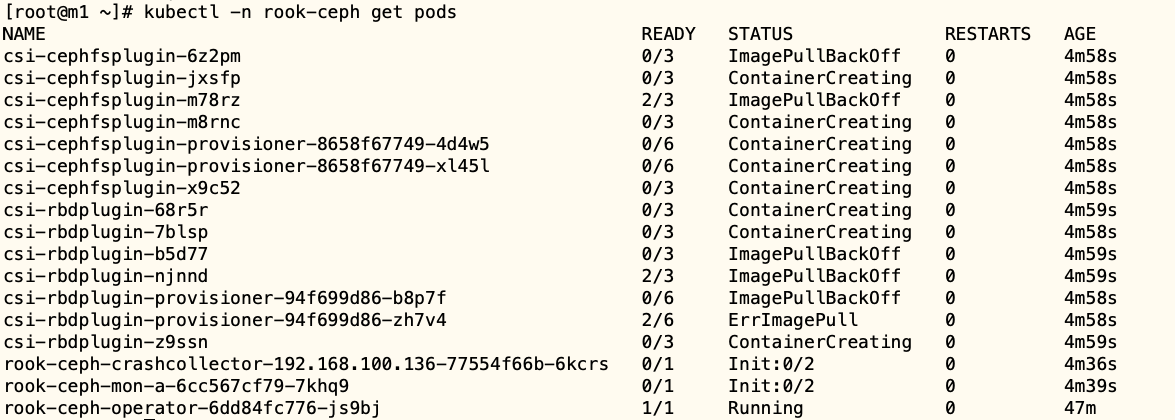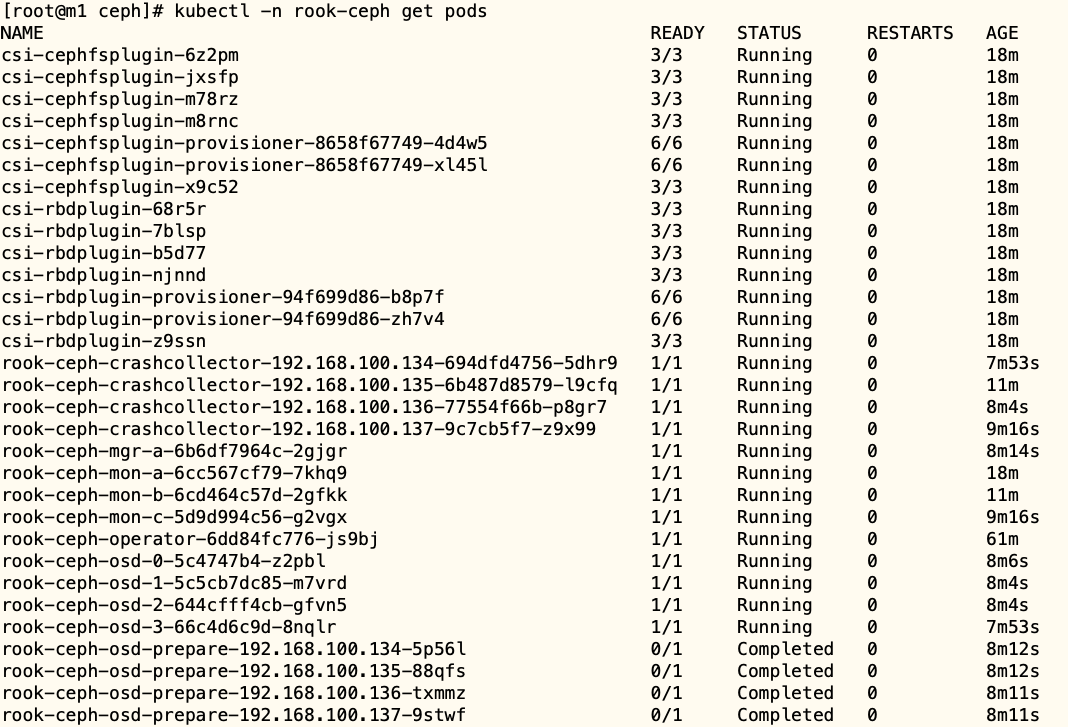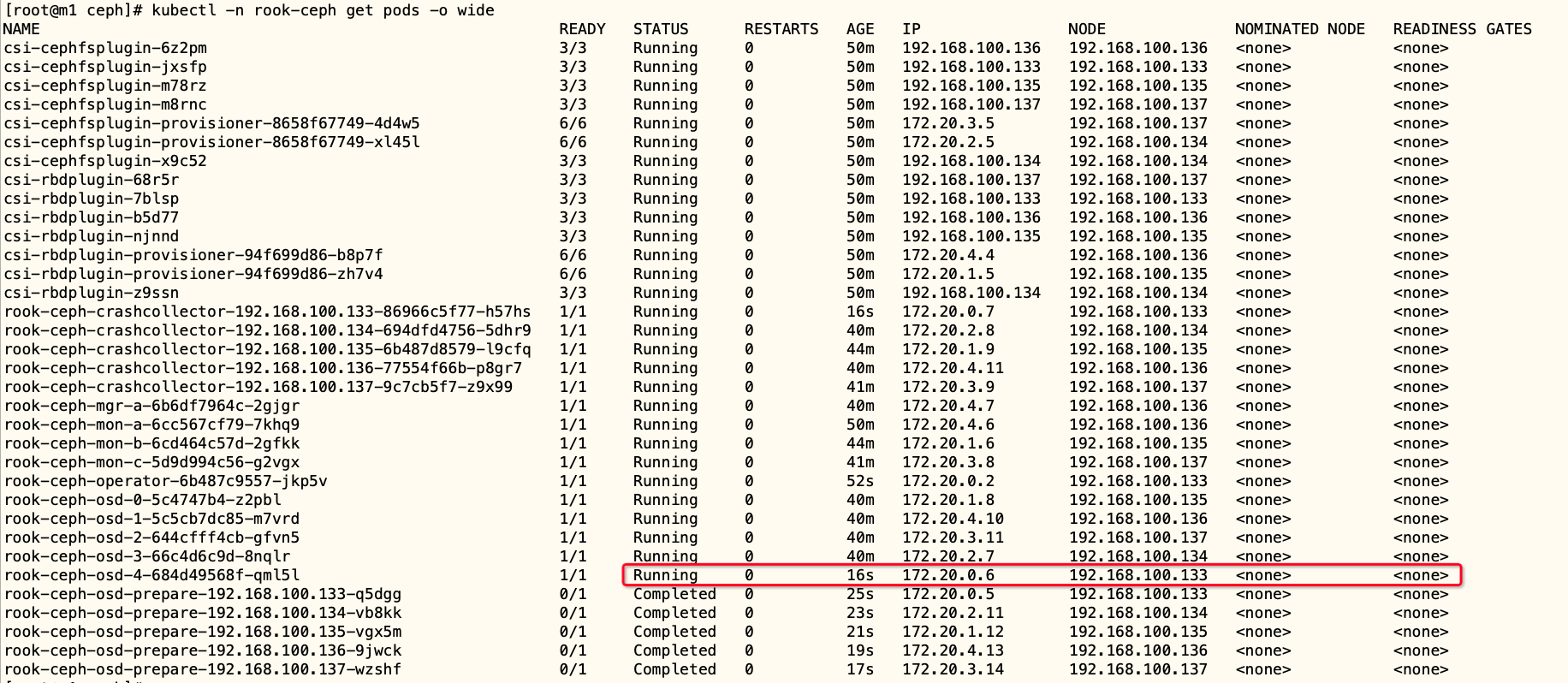03 Rook 基础(转载)
Rook 快速入⻔
集群环境介绍
需要提前安装
kubernetes环境,使用kubeasz安装集群
| 节点名称 | IP地址 | k8s节点⻆色 | 服务配置 | 组件名称 | 磁盘-50G |
|---|---|---|---|---|---|
| m1 | 192.168.100.133 | master | 2c3g | ceph-mon ceph-mgr ceph-osd csi-cephfsplugin csi-rdbplugin |
/dev/sdb |
| n1 | 192.168.100.134 | node | 2c3g | ceph-mon ceph-mgr ceph-osd csi-cephfsplugin csi-rdbplugin |
/dev/sdb |
| n2 | 192.168.100.135 | node | 2c3g | ceph-mon ceph-osd csi-cephfsplugin csi-rdbplugin |
/dev/sdb |
| n3 | 192.168.100.136 | node | 2c3g | ceph-osd csi-cephfsplugin csi-rdbplugin |
/dev/sdb |
| n4 | 192.168.100.137 | node | 2c3g | ceph-osd csi-cephfsplugin csi-rdbplugin |
/dev/sdb |
| 服务 | 版本 |
|---|---|
| CentOS | 7.9 |
| Docker | 20.10.5 |
| Kubernetes | 1.20.5 |
| Ansible | 2.9.27 |
| Kubeasz | 3.0.1 |
部署前提条件
前提条件
- 已部署好的kubernetes集群,版本1.11+ 部署参考文档
- osd节点需要有未格式化文件系统的磁盘
- 需要具备Linux基础
- 需要具备Ceph基础
- mon
- mds
- rgw
- osd
- 需要具备kubernetes基础
- Node, Pod, kubectl操作
- deployments/services/statefulsets
- Volume/PV/PVC/StorageClass
获取安装源码
获取 rook 安装源
[root@m1 ~]# git clone --single-branch --branch v1.5.5 https://github.com/rook/rook.git
Cloning into 'rook'...
目录树结构
需要执行的
yaml资源清单路径/root/rook/cluster/examples/kubernetes/
[root@m1 ~]# tree /root/rook/cluster/examples/kubernetes/
/root/rook/cluster/examples/kubernetes/
├── cassandra
│ ├── cluster.yaml
│ └── operator.yaml
├── ceph
│ ├── ceph-client.yaml
│ ├── cluster-external-management.yaml
│ ├── cluster-external.yaml
│ ├── cluster-on-pvc.yaml
│ ├── cluster-stretched.yaml
│ ├── cluster-test.yaml
│ ├── cluster-with-drive-groups.yaml
│ ├── cluster.yaml
│ ├── common-external.yaml
│ ├── common.yaml
│ ├── config-admission-controller.sh
│ ├── crds.yaml
│ ├── create-external-cluster-resources.py
│ ├── create-external-cluster-resources.sh
│ ├── csi
│ │ ├── cephfs
│ │ │ ├── kube-registry.yaml
│ │ │ ├── pod.yaml
│ │ │ ├── pvc-clone.yaml
│ │ │ ├── pvc-restore.yaml
│ │ │ ├── pvc.yaml
│ │ │ ├── snapshotclass.yaml
│ │ │ ├── snapshot.yaml
│ │ │ └── storageclass.yaml
│ │ ├── rbd
│ │ │ ├── pod.yaml
│ │ │ ├── pvc-clone.yaml
│ │ │ ├── pvc-restore.yaml
│ │ │ ├── pvc.yaml
│ │ │ ├── snapshotclass.yaml
│ │ │ ├── snapshot.yaml
│ │ │ ├── storageclass-ec.yaml
│ │ │ ├── storageclass-test.yaml
│ │ │ └── storageclass.yaml
│ │ └── template
│ │ ├── cephfs
│ │ │ ├── csi-cephfsplugin-provisioner-dep.yaml
│ │ │ ├── csi-cephfsplugin-svc.yaml
│ │ │ └── csi-cephfsplugin.yaml
│ │ └── rbd
│ │ ├── csi-rbdplugin-provisioner-dep.yaml
│ │ ├── csi-rbdplugin-svc.yaml
│ │ └── csi-rbdplugin.yaml
│ ├── dashboard-external-https.yaml
│ ├── dashboard-external-http.yaml
│ ├── dashboard-ingress-https.yaml
│ ├── dashboard-loadbalancer.yaml
│ ├── direct-mount.yaml
│ ├── filesystem-ec.yaml
│ ├── filesystem-test.yaml
│ ├── filesystem.yaml
│ ├── flex
│ │ ├── kube-registry.yaml
│ │ ├── storageclass-ec.yaml
│ │ ├── storageclass-test.yaml
│ │ └── storageclass.yaml
│ ├── import-external-cluster.sh
│ ├── monitoring
│ │ ├── csi-metrics-service-monitor.yaml
│ │ ├── prometheus-ceph-v14-rules-external.yaml
│ │ ├── prometheus-ceph-v14-rules.yaml
│ │ ├── prometheus-ceph-v15-rules-external.yaml -> prometheus-ceph-v14-rules-external.yaml
│ │ ├── prometheus-ceph-v15-rules.yaml -> prometheus-ceph-v14-rules.yaml
│ │ ├── prometheus-service.yaml
│ │ ├── prometheus.yaml
│ │ ├── rbac.yaml
│ │ └── service-monitor.yaml
│ ├── nfs-test.yaml
│ ├── nfs.yaml
│ ├── object-bucket-claim-delete.yaml
│ ├── object-bucket-claim-retain.yaml
│ ├── object-ec.yaml
│ ├── object-external.yaml
│ ├── object-multisite-pull-realm.yaml
│ ├── object-multisite.yaml
│ ├── object-openshift.yaml
│ ├── object-test.yaml
│ ├── object-user.yaml
│ ├── object.yaml
│ ├── operator-openshift.yaml
│ ├── operator.yaml
│ ├── osd-purge.yaml
│ ├── pool-ec.yaml
│ ├── pool-test.yaml
│ ├── pool.yaml
│ ├── pre-k8s-1.16
│ │ └── crds.yaml
│ ├── rbdmirror.yaml
│ ├── rgw-external.yaml
│ ├── scc.yaml
│ ├── storageclass-bucket-delete.yaml
│ ├── storageclass-bucket-retain.yaml
│ ├── toolbox-job.yaml
│ └── toolbox.yaml
├── cockroachdb
│ ├── cluster.yaml
│ ├── loadgen-kv.yaml
│ └── operator.yaml
├── edgefs
│ ├── cluster_kvssd.yaml
│ ├── cluster.yaml
│ ├── csi
│ │ ├── iscsi
│ │ │ ├── edgefs-iscsi-csi-driver-config.yaml
│ │ │ ├── edgefs-iscsi-csi-driver.yaml
│ │ │ └── examples
│ │ │ ├── dynamic-nginx.yaml
│ │ │ ├── pre-provisioned-nginx.yaml
│ │ │ └── snapshots
│ │ │ ├── create-snapshot.yaml
│ │ │ ├── nginx-snapshot-clone-volume.yaml
│ │ │ └── snapshot-class.yaml
│ │ └── nfs
│ │ ├── edgefs-nfs-csi-driver-config.yaml
│ │ ├── edgefs-nfs-csi-driver.yaml
│ │ └── examples
│ │ ├── dynamic-nginx.yaml
│ │ └── preprovisioned-edgefs-volume-nginx.yaml
│ ├── iscsi.yaml
│ ├── isgw.yaml
│ ├── monitoring
│ │ ├── prometheus-service.yaml
│ │ ├── prometheus.yaml
│ │ └── service-monitor.yaml
│ ├── nfs.yaml
│ ├── operator.yaml
│ ├── persistent-volume.yaml
│ ├── s3PayloadSecret.yaml
│ ├── s3x.yaml
│ ├── s3.yaml
│ ├── smb.yaml
│ ├── sslKeyCertificate.yaml
│ ├── storage-class.yaml
│ ├── swift.yaml
│ └── upgrade-from-v1beta1-create.yaml
├── mysql.yaml
├── nfs
│ ├── busybox-rc.yaml
│ ├── common.yaml
│ ├── nfs-ceph.yaml
│ ├── nfs-xfs.yaml
│ ├── nfs.yaml
│ ├── operator.yaml
│ ├── psp.yaml
│ ├── pvc.yaml
│ ├── rbac.yaml
│ ├── scc.yaml
│ ├── sc.yaml
│ ├── webhook.yaml
│ ├── web-rc.yaml
│ └── web-service.yaml
├── README.md
├── wordpress.yaml
└── yugabytedb
├── cluster.yaml
└── operator.yaml
每一个存储
driver录下包含有相关的安装部署方法,均会包含一个核心的组件operator
部署 rook 自定义资源对象
[root@m1 ~]# cd rook/cluster/examples/kubernetes/ceph/
[root@m1 ceph]# kubectl apply -f crds.yaml
customresourcedefinition.apiextensions.k8s.io/cephclusters.ceph.rook.io created
customresourcedefinition.apiextensions.k8s.io/cephclients.ceph.rook.io created
customresourcedefinition.apiextensions.k8s.io/cephrbdmirrors.ceph.rook.io created
customresourcedefinition.apiextensions.k8s.io/cephfilesystems.ceph.rook.io created
customresourcedefinition.apiextensions.k8s.io/cephnfses.ceph.rook.io created
customresourcedefinition.apiextensions.k8s.io/cephobjectstores.ceph.rook.io created
customresourcedefinition.apiextensions.k8s.io/cephobjectstoreusers.ceph.rook.io created
customresourcedefinition.apiextensions.k8s.io/cephobjectrealms.ceph.rook.io created
customresourcedefinition.apiextensions.k8s.io/cephobjectzonegroups.ceph.rook.io created
customresourcedefinition.apiextensions.k8s.io/cephobjectzones.ceph.rook.io created
customresourcedefinition.apiextensions.k8s.io/cephblockpools.ceph.rook.io created
customresourcedefinition.apiextensions.k8s.io/volumes.rook.io created
customresourcedefinition.apiextensions.k8s.io/objectbuckets.objectbucket.io created
customresourcedefinition.apiextensions.k8s.io/objectbucketclaims.objectbucket.io created
crds 中包含有 Ceph 的相关自定义资源对象,如:
- cephclusters
- cephclients
- volumes
- cephfilesystem
- cephobjectstores
- objectbuckets
- objectbucketclaims等
通过 kubectl get customresourcedefinitions.apiextensions.k8s.io 可以获取到自定义资源对象
[root@m1 ceph]# kubectl get customresourcedefinitions.apiextensions.k8s.io
NAME CREATED AT
cephblockpools.ceph.rook.io 2022-11-23T01:43:32Z
cephclients.ceph.rook.io 2022-11-23T01:43:32Z
cephclusters.ceph.rook.io 2022-11-23T01:43:32Z
cephfilesystems.ceph.rook.io 2022-11-23T01:43:32Z
cephnfses.ceph.rook.io 2022-11-23T01:43:32Z
cephobjectrealms.ceph.rook.io 2022-11-23T01:43:32Z
cephobjectstores.ceph.rook.io 2022-11-23T01:43:32Z
cephobjectstoreusers.ceph.rook.io 2022-11-23T01:43:32Z
cephobjectzonegroups.ceph.rook.io 2022-11-23T01:43:32Z
cephobjectzones.ceph.rook.io 2022-11-23T01:43:32Z
cephrbdmirrors.ceph.rook.io 2022-11-23T01:43:32Z
objectbucketclaims.objectbucket.io 2022-11-23T01:43:32Z
objectbuckets.objectbucket.io 2022-11-23T01:43:32Z
volumes.rook.io 2022-11-23T01:43:32Z
部署集群认证信息
[root@m1 ceph]# kubectl apply -f common.yaml
namespace/rook-ceph created
clusterrolebinding.rbac.authorization.k8s.io/rook-ceph-object-bucket created
serviceaccount/rook-ceph-admission-controller created
clusterrole.rbac.authorization.k8s.io/rook-ceph-admission-controller-role created
clusterrolebinding.rbac.authorization.k8s.io/rook-ceph-admission-controller-rolebinding created
clusterrole.rbac.authorization.k8s.io/rook-ceph-cluster-mgmt created
role.rbac.authorization.k8s.io/rook-ceph-system created
clusterrole.rbac.authorization.k8s.io/rook-ceph-global created
clusterrole.rbac.authorization.k8s.io/rook-ceph-mgr-cluster created
clusterrole.rbac.authorization.k8s.io/rook-ceph-object-bucket created
serviceaccount/rook-ceph-system created
rolebinding.rbac.authorization.k8s.io/rook-ceph-system created
clusterrolebinding.rbac.authorization.k8s.io/rook-ceph-global created
serviceaccount/rook-ceph-osd created
serviceaccount/rook-ceph-mgr created
serviceaccount/rook-ceph-cmd-reporter created
role.rbac.authorization.k8s.io/rook-ceph-osd created
clusterrole.rbac.authorization.k8s.io/rook-ceph-osd created
clusterrole.rbac.authorization.k8s.io/rook-ceph-mgr-system created
role.rbac.authorization.k8s.io/rook-ceph-mgr created
role.rbac.authorization.k8s.io/rook-ceph-cmd-reporter created
rolebinding.rbac.authorization.k8s.io/rook-ceph-cluster-mgmt created
rolebinding.rbac.authorization.k8s.io/rook-ceph-osd created
rolebinding.rbac.authorization.k8s.io/rook-ceph-mgr created
rolebinding.rbac.authorization.k8s.io/rook-ceph-mgr-system created
clusterrolebinding.rbac.authorization.k8s.io/rook-ceph-mgr-cluster created
clusterrolebinding.rbac.authorization.k8s.io/rook-ceph-osd created
rolebinding.rbac.authorization.k8s.io/rook-ceph-cmd-reporter created
podsecuritypolicy.policy/00-rook-privileged created
clusterrole.rbac.authorization.k8s.io/psp:rook created
clusterrolebinding.rbac.authorization.k8s.io/rook-ceph-system-psp created
rolebinding.rbac.authorization.k8s.io/rook-ceph-default-psp created
rolebinding.rbac.authorization.k8s.io/rook-ceph-osd-psp created
rolebinding.rbac.authorization.k8s.io/rook-ceph-mgr-psp created
rolebinding.rbac.authorization.k8s.io/rook-ceph-cmd-reporter-psp created
serviceaccount/rook-csi-cephfs-plugin-sa created
serviceaccount/rook-csi-cephfs-provisioner-sa created
role.rbac.authorization.k8s.io/cephfs-external-provisioner-cfg created
rolebinding.rbac.authorization.k8s.io/cephfs-csi-provisioner-role-cfg created
clusterrole.rbac.authorization.k8s.io/cephfs-csi-nodeplugin created
clusterrole.rbac.authorization.k8s.io/cephfs-external-provisioner-runner created
clusterrolebinding.rbac.authorization.k8s.io/rook-csi-cephfs-plugin-sa-psp created
clusterrolebinding.rbac.authorization.k8s.io/rook-csi-cephfs-provisioner-sa-psp created
clusterrolebinding.rbac.authorization.k8s.io/cephfs-csi-nodeplugin created
clusterrolebinding.rbac.authorization.k8s.io/cephfs-csi-provisioner-role created
serviceaccount/rook-csi-rbd-plugin-sa created
serviceaccount/rook-csi-rbd-provisioner-sa created
role.rbac.authorization.k8s.io/rbd-external-provisioner-cfg created
rolebinding.rbac.authorization.k8s.io/rbd-csi-provisioner-role-cfg created
clusterrole.rbac.authorization.k8s.io/rbd-csi-nodeplugin created
clusterrole.rbac.authorization.k8s.io/rbd-external-provisioner-runner created
clusterrolebinding.rbac.authorization.k8s.io/rook-csi-rbd-plugin-sa-psp created
clusterrolebinding.rbac.authorization.k8s.io/rook-csi-rbd-provisioner-sa-psp created
clusterrolebinding.rbac.authorization.k8s.io/rbd-csi-nodeplugin created
clusterrolebinding.rbac.authorization.k8s.io/rbd-csi-provisioner-role created
会自动生成 RBAC 认证相关的⻆色,包括:
- Role
- clusterrole
- clusterrolebinding
- serviceaccount等对象
通过可以获取到对应权限信息
- kubectl get clusterrole
- kubectl get clusterrolebindings.rbac.authorization.k8s.io
- kubectl get serviceaccounts -n rook-ceph
clusterrole 和 clusterrolebindings 是 kubernetes 中集群级别的资源, serviceaccounts 则是 namespace
级资源
operator 详解
部署 operator
[root@m1 ceph]# kubectl apply -f operator.yaml
configmap/rook-ceph-operator-config created
deployment.apps/rook-ceph-operator created
会通过 deployment 创建一个 pods 容器管理 Ceph 集群,配置文件包含在 configmap 中,通过如下可以查看到
[root@m1 ceph]# kubectl get deploy -n rook-ceph
NAME READY UP-TO-DATE AVAILABLE AGE
rook-ceph-operator 0/1 1 0 33s
[root@m1 ceph]# kubectl get cm -n rook-ceph
NAME DATA AGE
kube-root-ca.crt 1 3m45s
rook-ceph-operator-config 6 42s
拉取 ceph 镜像
ceph的镜像空间较大,包含有1G的容量,因此pods创建过程中需要较⻓的时间,可以通过手动方式拉取镜像
[root@m1 ceph]# docker image pull rook/ceph:v1.5.5
下载后将其导出
[root@m1 ceph]# docker image save -o /root/rook-ceph.tar rook/ceph:v1.5.5
复制到其他节点
ansible hosts配置[all] m1 n1 n2 n3 n4
[root@m1 ceph]# ansible all -m copy -a "src=/root/rook-ceph.tar dest=/tmp/" -v
Using /etc/ansible/ansible.cfg as config file
n1 | CHANGED => {
"ansible_facts": {
"discovered_interpreter_python": "/usr/bin/python"
},
"changed": true,
"checksum": "f1c89007f07ab53fb98b850cea437433958e4ebf",
"dest": "/tmp/rook-ceph.tar",
"gid": 0,
"group": "root",
"md5sum": "8516a3d210085403a3b83b4dcfb01150",
"mode": "0644",
"owner": "root",
"size": 1066678272,
"src": "/root/.ansible/tmp/ansible-tmp-1669170022.55-96522-49181090820854/source",
"state": "file",
"uid": 0
}
n4 | CHANGED => {
"ansible_facts": {
"discovered_interpreter_python": "/usr/bin/python"
},
"changed": true,
"checksum": "f1c89007f07ab53fb98b850cea437433958e4ebf",
"dest": "/tmp/rook-ceph.tar",
"gid": 0,
"group": "root",
"md5sum": "8516a3d210085403a3b83b4dcfb01150",
"mode": "0644",
"owner": "root",
"size": 1066678272,
"src": "/root/.ansible/tmp/ansible-tmp-1669170022.58-96529-44939501615986/source",
"state": "file",
"uid": 0
}
m1 | CHANGED => {
"ansible_facts": {
"discovered_interpreter_python": "/usr/bin/python"
},
"changed": true,
"checksum": "f1c89007f07ab53fb98b850cea437433958e4ebf",
"dest": "/tmp/rook-ceph.tar",
"gid": 0,
"group": "root",
"md5sum": "8516a3d210085403a3b83b4dcfb01150",
"mode": "0644",
"owner": "root",
"size": 1066678272,
"src": "/root/.ansible/tmp/ansible-tmp-1669170022.48-96520-229124032996439/source",
"state": "file",
"uid": 0
}
n2 | CHANGED => {
"ansible_facts": {
"discovered_interpreter_python": "/usr/bin/python"
},
"changed": true,
"checksum": "f1c89007f07ab53fb98b850cea437433958e4ebf",
"dest": "/tmp/rook-ceph.tar",
"gid": 0,
"group": "root",
"md5sum": "8516a3d210085403a3b83b4dcfb01150",
"mode": "0644",
"owner": "root",
"size": 1066678272,
"src": "/root/.ansible/tmp/ansible-tmp-1669170022.72-96524-274832934731995/source",
"state": "file",
"uid": 0
}
n3 | CHANGED => {
"ansible_facts": {
"discovered_interpreter_python": "/usr/bin/python"
},
"changed": true,
"checksum": "f1c89007f07ab53fb98b850cea437433958e4ebf",
"dest": "/tmp/rook-ceph.tar",
"gid": 0,
"group": "root",
"md5sum": "8516a3d210085403a3b83b4dcfb01150",
"mode": "0644",
"owner": "root",
"size": 1066678272,
"src": "/root/.ansible/tmp/ansible-tmp-1669170022.64-96527-61530936196590/source",
"state": "file",
"uid": 0
}
然后在其他节点上导入
[root@m1 ceph]# ansible all -m shell -a "docker image load -i /tmp/rook-ceph.tar"
m1 | CHANGED | rc=0 >>
Loaded image: rook/ceph:v1.5.5
n1 | CHANGED | rc=0 >>
Loaded image: rook/ceph:v1.5.5
n2 | CHANGED | rc=0 >>
Loaded image: rook/ceph:v1.5.5
n4 | CHANGED | rc=0 >>
Loaded image: rook/ceph:v1.5.5
n3 | CHANGED | rc=0 >>
Loaded image: rook/ceph:v1.5.5
cluster 详解
创建 cluster
[root@m1 ceph]# kubectl apply -f cluster.yaml
cephcluster.ceph.rook.io/rook-ceph created

集群创建过程
通过 logs 可以看到 Ceph 集群初始化的过程,初始化是通过 rook operator 进行控制的,operator 会自动编排 ceph mon,mgr,osd 等⻆色的初始化过程
[root@m1 ceph]# kubectl logs rook-ceph-operator-6dd84fc776-js9bj -n rook-ceph -f
包含有以下等动作:
- mon集群初始化
- CSI认证所需key
- mgr初始化
- osd初始化
获取 CSI 镜像
此时集群会自动创建 pods 来构建 Ceph 集群,包括 mon,mgr,osd 等⻆色,初次之外还会在每一个节点部署驱动,包含有 rbd 和 cephfs 两种不同的驱动类型,两种驱动镜像需要到 google 下载,因此需要手动拉取一下,先获取到镜像的名称
[root@m1 ceph]# for i in `kubectl get pods -n rook-ceph -o jsonpath='{.items[*].spec.containers[*].image}'`;do echo ${i} | grep gcr.io;done
k8s.gcr.io/sig-storage/csi-node-driver-registrar:v2.0.1
k8s.gcr.io/sig-storage/csi-node-driver-registrar:v2.0.1
k8s.gcr.io/sig-storage/csi-node-driver-registrar:v2.0.1
k8s.gcr.io/sig-storage/csi-node-driver-registrar:v2.0.1
k8s.gcr.io/sig-storage/csi-attacher:v3.0.0
k8s.gcr.io/sig-storage/csi-snapshotter:v3.0.0
k8s.gcr.io/sig-storage/csi-resizer:v1.0.0
k8s.gcr.io/sig-storage/csi-provisioner:v2.0.0
k8s.gcr.io/sig-storage/csi-attacher:v3.0.0
k8s.gcr.io/sig-storage/csi-snapshotter:v3.0.0
k8s.gcr.io/sig-storage/csi-resizer:v1.0.0
k8s.gcr.io/sig-storage/csi-provisioner:v2.0.0
k8s.gcr.io/sig-storage/csi-node-driver-registrar:v2.0.1
k8s.gcr.io/sig-storage/csi-node-driver-registrar:v2.0.1
k8s.gcr.io/sig-storage/csi-node-driver-registrar:v2.0.1
k8s.gcr.io/sig-storage/csi-node-driver-registrar:v2.0.1
k8s.gcr.io/sig-storage/csi-node-driver-registrar:v2.0.1
k8s.gcr.io/sig-storage/csi-provisioner:v2.0.0
k8s.gcr.io/sig-storage/csi-resizer:v1.0.0
k8s.gcr.io/sig-storage/csi-attacher:v3.0.0
k8s.gcr.io/sig-storage/csi-snapshotter:v3.0.0
k8s.gcr.io/sig-storage/csi-provisioner:v2.0.0
k8s.gcr.io/sig-storage/csi-resizer:v1.0.0
k8s.gcr.io/sig-storage/csi-attacher:v3.0.0
k8s.gcr.io/sig-storage/csi-snapshotter:v3.0.0
k8s.gcr.io/sig-storage/csi-node-driver-registrar:v2.0.1
从国内的镜像手动拉取一下,使用如下脚本替换
[root@m1 ceph]# cat /tmp/1.sh
#!/bin/bash
image_list=(
csi-node-driver-registrar:v2.0.1
csi-attacher:v3.0.0
csi-snapshotter:v3.0.0
csi-resizer:v1.0.0
csi-provisioner:v2.0.0
)
aliyuncs="registry.aliyuncs.com/it00021hot"
google_gcr="k8s.gcr.io/sig-storage"
for image in ${image_list[*]}
do
docker image pull ${aliyuncs}/${image}
docker image tag ${aliyuncs}/${image} ${google_gcr}/${image}
docker image rm ${aliyuncs}/${image}
echo "${aliyuncs}/${image} ${google_gcr}/${image} downloaded."
done
执行脚本
[root@m1 ceph]# ansible all -m copy -a "src=/tmp/1.sh dest=/tmp/2.sh"
[root@m1 ceph]# ansible all -m shell -a "bash /tmp/2.sh"
确认 pods 运行情况

除了使用上述的方法之外,也可以在 operator.yaml 文件中修改镜像仓库的地址,如:
[root@m1 ceph]# cat operator.yaml | grep IMAGE
# ROOK_CSI_CEPH_IMAGE: "quay.io/cephcsi/cephcsi:v3.2.0"
# ROOK_CSI_REGISTRAR_IMAGE: "k8s.gcr.io/sig-storage/csi-node-driver-registrar:v2.0.1"
# ROOK_CSI_RESIZER_IMAGE: "k8s.gcr.io/sig-storage/csi-resizer:v1.0.0"
# ROOK_CSI_PROVISIONER_IMAGE: "k8s.gcr.io/sig-storage/csi-provisioner:v2.0.0"
# ROOK_CSI_SNAPSHOTTER_IMAGE: "k8s.gcr.io/sig-storage/csi-snapshotter:v3.0.0"
# ROOK_CSI_ATTACHER_IMAGE: "k8s.gcr.io/sig-storage/csi-attacher:v3.0.0"
ROOK_CSI_CEPH_IMAGE: "quay.io/cephcsi/cephcsi:v3.2.0"
ROOK_CSI_REGISTRAR_IMAGE: "registry.aliyuncs.com/it00021hot/csi-node-driver-registrar:v2.0.1"
ROOK_CSI_RESIZER_IMAGE: "registry.aliyuncs.com/it00021hot/csi-resizer:v1.0.0"
ROOK_CSI_PROVISIONER_IMAGE: "registry.aliyuncs.com/it00021hot/csi-provisioner:v2.0.0"
ROOK_CSI_SNAPSHOTTER_IMAGE: "registry.aliyuncs.com/it00021hot/csi-snapshotter:v3.0.0"
ROOK_CSI_ATTACHER_IMAGE: "registry.aliyuncs.com/it00021hot/csi-attacher:v3.0.0"
master 加入 osd
默认 master 节点没有加入到 Ceph 集群中作为 osd 存储⻆色,是因为 master 节点默认设置了污点,因此默认不会将其调度到 master 节点,解决方法:
- 设置osd的调度参数,设置污点容忍,设置方法可以在cluster.yaml中的placement中调整tolerations参数
- 删除master的污点
[root@m1 ceph]# kubectl taint nodes 192.168.100.133 node.kubernetes.io/unschedulable:NoSchedule-
node/192.168.100.133 untainted
调整 osd 发现参数
配置中使用了所有的节点和节点所有的设备,rook 会自动去扫描所有节点的设备,一旦有节点或者磁盘
添加进来,会自动将其添加到 Ceph 集群中,operator 是通过启动 rook-discover 一个容器定期去扫描,参数为 ROOK_DISCOVER_DEVICES_INTERVAL
间隔默认是 60m,为了看到效果,将其调整为 60s,然后在重新 kubectp apply -f operator.yaml,可以 m1 的 osd 也添加至了集群中
# The duration between discovering devices in the rook-discover daemonset.
- name: ROOK_DISCOVER_DEVICES_INTERVAL
# value: "60m"
value: "60s"
[root@m1 ceph]# kubectl apply -f operator.yaml
configmap/rook-ceph-operator-config unchanged
deployment.apps/rook-ceph-operator configured




【推荐】国内首个AI IDE,深度理解中文开发场景,立即下载体验Trae
【推荐】编程新体验,更懂你的AI,立即体验豆包MarsCode编程助手
【推荐】抖音旗下AI助手豆包,你的智能百科全书,全免费不限次数
【推荐】轻量又高性能的 SSH 工具 IShell:AI 加持,快人一步
· 震惊!C++程序真的从main开始吗?99%的程序员都答错了
· 【硬核科普】Trae如何「偷看」你的代码?零基础破解AI编程运行原理
· 单元测试从入门到精通
· 上周热点回顾(3.3-3.9)
· Vue3状态管理终极指南:Pinia保姆级教程